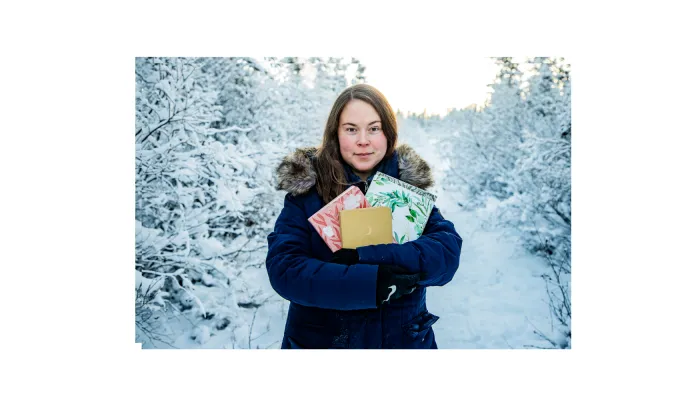Hoa Nguyen
Biography
Born in the Mekong Delta and a dual citizen of the US and Canada, Hoa Nguyen is a poet and professor of creative writing and poetics at Toronto Metropolitan University. An author of six acclaimed poetry collections, her books include As Long As Trees Last, Red Juice: Poems 1998-2008, and the Griffin Prize-nominated Violet Energy Ingots. Her most recent book, A Thousand Times You Lose Your Treasure (Wave Books, 2021), won the Canada Book Award and was a finalist for a National Book Award, the Governor General’s Literary Award for Poetry, and the Kingsley Tufts Poetry Award.
Hoa's work has garnered international recognition, including, in 2019, a nomination for the Neustadt International Prize for Literature and the 2024 C.D. Wright Award in Poetry from the Foundation for Contemporary Arts. She is an integral member of the She Who Has No Master(s) collective, a project of collectivity, hybrid poetics, encounters, in-between spaces and (dis)places of the Vietnamese diaspora, and regularly contributes to and co-curates their multimedia multi-voiced poetry projects.
Micro-interview
I sought out and read poetry in high school. I was drawn to Plath, Millay, and Dickinson—their fine ear for music in poetry. I read e. e. cummings and poems in anthologies. I also was drawn to folk poetries and poems by “Anonymous”, the notion that the poem endures even beyond the self.
I wish I could remember the name of the poet who came and talked to my English class my sophomore or junior year at Charles W. Woodward high school in Montgomery County, Maryland, where I grew up. He was a younger white man and he gave a presentation and fielded questions from our class. One student asked what he thought of e. e. cummings (the question carried an assumption that e. e. cummings was sort of a joke) and the poet in response talked about how he admired the poem “Buffalo Bill’s” and recited it on the spot. He completely changed the space with a poem, charged it with this other energy.
When I was maybe 12, I discovered an anthology of Vietnamese poetry translated into English in my public library called A Thousand Years of Vietnamese Poetry. The first line from the introduction read something like, “The Vietnamese people have always considered themselves poets” and it unlocked something in me and granted me a kind of permission to write poetry.
I think I always wrote poems, but I didn’t claim my life as a poet until in my mid twenties. I took poetry workshops as an undergraduate at the University of Maryland and after earning my degree in Psychology, I enrolled in a workshop at the Bethesda Writers Center at the encouragement of poet friend June Coleman Magrab. At the time, I was working as a bartender trying to figure out my next move. I knew from watching my mother’s life how hard it was to have a career in the service industry. When I told June that I was thinking about applying for a Masters in Social Work—my attempt at being practical—she asked, “Why not get an MFA in writing?” I put the thought aside as unworkable until several months later, just before Christmas, when a young woman I worked with, a friend, died in a fatal car accident. The collective grief was a horrible roar. I gave a eulogy for her at the funeral.
The experience made me realize that I needed to make the most of this life even if it meant risk and failure. And standing in front of a large group of grieving family and friends and speaking what I had written on love and loss allowed me to understand the incredible transformative power of words. That’s when I decided that I needed to claim my life as a poet.
To read poetry, to write poetry, to be, as Shelley says, “the unacknowledged legislators of the world.”
I’m interested in representing Asian women outside of the typical stereotypes offered in the West in literature or popular culture. Just today I was reading this analysis on the vilified and anonymous representation of Asians in the film No Escape, an action movie set in a nameless Asian country with white people as the only central characters. The critic elaborates: “Meanwhile, not a single girl of color or woman of color speaks an important line of dialogue in the entire film. In fact, women of color remain the most indistinct group of all in No Escape. They are more likely to be referenced in relation to sex work than they are to speak. Which taps into another racist, misogynistic tradition of exotifying and hyper-sexualizing Asian women.”
This poem [“My Idea of the Circus Is My Idea of the Circus Otherwise Known As: My Mother Was a Celebrated Stunt Motorcyclist, Vietnam, 1958 to 1962”]is my way of answering back to these kinds of stereotypes and lack of true representation and is part of a series that I am developing. Part verse meditation and part documentary on 1960s Vietnam, it is a poetic narrative that includes a verse biography on my mother, Diệp Nguyễn, a stunt motorcyclist in an all-woman circus troupe. My aim for the series is to investigate historical, personal, and cultural pressures of the period—as well as the difficulties of distance, memory and language itself.
I would be tempted to choose Wilfred Owen’s poem “Dulce Et Decorum Est” a poem I encountered and fell in love with as a teen. I admire its formal features and how he manages to chillingly speak to the horrors of chemical warfare and talk back to the “old lie” by Horace, that it is “sweet and fitting to die for one’s country.”


